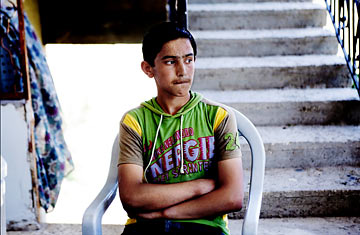
13-year-old Walid Abu Obeida recounted his time in an Israeli prison
(2 of 2)
The Geneva organization's report alleges that under Israeli military justice, it is the norm for children to be interrogated by the Israeli police and army without either a lawyer or a family member present and that most of their convictions are due to confessions extracted during interrogation sessions or from "secret evidence," usually tip-offs from unnamed Palestinian informers. If so, the practice may violate the U.N. Convention Against Torture, which Israel ratified in 1991. In response to TIME's queries, a lawyer for the Israel Defense Forces (IDF) said that under "security legislation" and Israel's interpretation of international law, no lawyer or relative need be present during a child's interrogation.
The children's rights defenders collected testimony from 33 minors, including a child identified merely as "Ezzat H.," who described a "soldier wearing black sunglasses [who] came into the room where I was held and pointed his rifle at me. The rifle barrel was a few centimeters from my face. I was so terrified that I started to shiver. He made fun of me and said: 'Shivering? Tell me where the [father's hidden] pistol is before I shoot you.' " According to the report, Ezzat was 10 years old at the time. TIME asked the IDF to comment on the specific incidents mentioned in the report, but a spokesman said that would be impossible without knowing the names of the soldiers allegedly involved.
Often, children suffer lasting traumas from jail. Says Saleh Nazzal of the Palestinian Ministry of Prisoner Affairs: "When soldiers burst into a house and drag away a child, he loses his feeling of being protected by his family. He comes back from prison alienated from his family, his friends. They don't like going back to school or even leaving the house. They start wetting their beds." Says Mona Zaghrout, a YMCA counselor who helps kids returning from prison: "They come out of prison thinking and acting like they are men. Their childhood is gone." And they often turn to another father figure — the armed militant groups fighting the Israeli occupation.
According to the Israeli human-rights group Breaking the Silence, a few Israeli soldiers are alarmed by their own troops' behavior. The group cites the testimony of two officers who complained before a military court that during an operation last March in Hares village, soldiers herded 150 male villagers, some as young as 14, into a schoolyard in the middle of the night, where they were kept bound, blindfolded and beaten over the course of more than 12 hours.
A U.N. Committee Against Torture, which met on May 15 in Geneva, expressed its "concern" over Israel's alleged abuses of Palestinian child prisoners. The IDF denies any ill treatment of children detainees and insists that all claims are thoroughly investigated and that the number of complaints has dropped. But Khalid Quzman, a defense lawyer at the Israeli military courts, says, "We don't complain anymore because it's a waste of time." More than 600 complaints of torture and ill treatment were filed between 2001 and 2008, he says, "and not a single criminal investigation was ever carried out."
Inculcating respect for an occupying force is, of course, a difficult task under any circumstances. In the case of the Palestinians, history and society have made hatred for Israel almost an instinct. Still, there was shock in June among Palestinians when members of a West Bank family were accused of hanging a boy for suspected collaboration with Israeli forces.
Israel's treatment of Palestinian children and teens as combatants perpetuates the cycle of hatred. After a spell in an Israeli jail, it's hard for a young Palestinian to stay uninvolved. Walid says he never cared much for anything aside from his school friends and family before his incarceration. Now he bears a radioactive hatred towards Israelis. "The soldiers' curses and insults, I'll carry them to my grave," he says. — With reporting by Jamil Hamad / Hebron and Yonit Farago / Jerusalem
